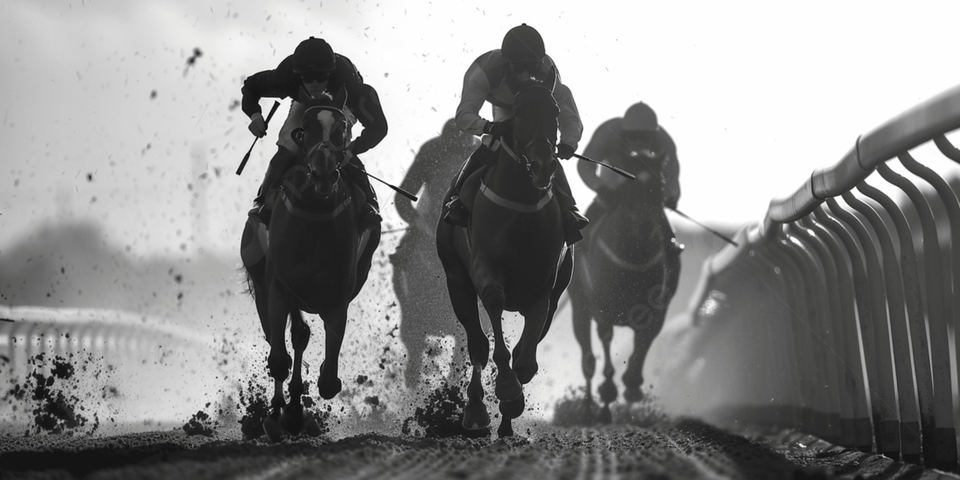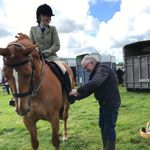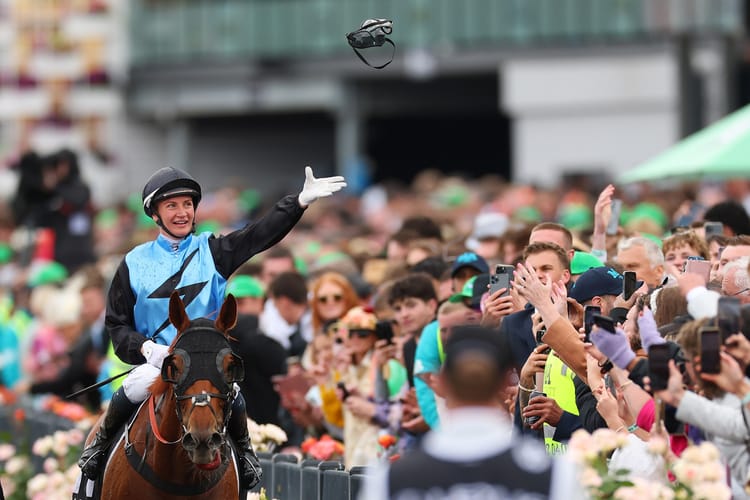The Next Hurdle: Female Jockeys, Motherhood and the Reality of Racing

By EQUITAS Editorial Team
In a quietly groundbreaking study, Dr Cíara Losty, a sport and performance psychologist based at South East Technological University, Waterford, has brought to light one of the most under-examined subjects in equestrian sport: the lived realities of motherhood and its perceived incompatibility with a career in horse racing.
Published in Acta Psychologica, the paper, co-authored with Dr Shubha Sreenivas of Wrexham University, investigates what it means to be a female jockey in Ireland and the UK who is either contemplating motherhood or already living it. Using a reflexive, thematic approach and drawing on the voices of ten licensed jockeys, the study delivers an unfiltered account of an industry still entrenched in a masculine model of performance, identity, and opportunity.
The study reveals a world where pregnancy is likened to injury, where career aspirations and bodily autonomy are locked in conflict, and where female jockeys feel they must choose between the saddle and starting a family. It does not offer abstract calls for reform. Instead, it asks us to listen.
Racing and Motherhood: A Binary Choice
The findings are stark. Among the ten women interviewed, only one was a mother. For the rest, motherhood was something to be deferred until retirement, often framed as a separate life entirely. Several jockeys expressed the belief that pregnancy was not simply a temporary pause but a permanent derailment of their racing careers.
“I feel like it's a chapter in my life riding as a jockey and being a mother is another chapter. And I just can't see how the two would work,” said Participant 2. “I can't expect to leave that because I'm pregnant and walk back into it again, it's not how it works in racing.”
The incompatibility of motherhood and racing was voiced not as a hypothetical tension, but a lived and accepted reality within the sport. For Participant 3, even the idea of marriage had to be strategically delayed, as it symbolised the start of a family and the end of a career:
“I'm pushing out our wedding as far as I can. Because the minute we're married, it means a baby. And the minute I have a baby, I have to give up riding. And I'm not ready to do that.”
What emerges is a pattern of women who are not merely deferring family but restructuring their lives entirely around an inflexible career model that sees motherhood as a career-ending event.
The Physical Body as Battleground
In racing, the body is the instrument of livelihood. Yet, for female jockeys, that same body becomes the battleground when motherhood enters the picture. Pregnancy is not viewed as a physiological event to be supported, but as a threat to form, fitness, and financial stability.
“I can only imagine from what I do know, the changes that happen in your body are out of this world. And that would be worse, I would say, than having a bad injury,” said Participant 8.
Some participants described pregnancy as akin to injury — but worse, because it carries a longer recovery and no guarantees of return. The pressure of perception from trainers and owners exacerbates this.
“You might not come back and be able to ride all these horses that you usually ride. Because they'd be like, oh she's going to ride way more negatively because she doesn't want to hurt herself,” said Participant 8.
An Unspoken Culture
The unrelenting silence around motherhood in racing was another key theme. The topic, according to many of the women, is considered taboo. There are few role models, little guidance, and no formalised return-to-work pathways. The lack of visible mothers who have returned to racing feeds a broader perception that it simply cannot be done.
“We don't have a lot of role models. I can only think of one that has a baby and is still riding regularly,” said Participant 7.
Others referred to the industry as operating under an "old-school mindset," where parenting, particularly mothering, is not only unsupported but openly discouraged.
“I know this sounds bad, but for a lad it's easier to get away from the family I think than a mother,” said Participant 1.
Motherhood as Risk, Not Reality
Even for those who wanted children, the risks felt too high. These were not just physical risks, but psychological and professional ones. Several women described how their sense of responsibility to a potential child would conflict with the dangerous nature of racing.
“I just feel like it would be selfish of me because if I got an injury... my babies are at home without me,” said Participant 3.
The risk of injury in national hunt racing is among the highest of any sport, with up to 91.4 falls and 14.7 injuries per 1000 rides. Female jockeys must weigh not just their own safety, but the consequences of that risk on a child.
The Silence of Policy
There are no dedicated maternity policies for jockeys in racing across Ireland or the UK. Unlike sports such as rugby or athletics, which have introduced paid maternity leave and family support measures, racing offers no such safety net. Without policies or guarantees, female jockeys face the prospect of rebuilding their careers from scratch — or not returning at all.
“There's no safety net for you to come back and do what you were doing,” said Participant 9.
“It's tough... you kind of lose a lot of your income when something like that happens. And no maternity leave,” added Participant 5.

Where We Are Now
Dr Losty’s research offers more than insight — it offers presence. It fills a silence that has existed for too long in both academic literature and the broader conversation around sport and gender. The findings paint a portrait of an industry where gender parity exists on paper but not in practice, and where the price of success for female jockeys is often the postponement or abandonment of motherhood.
There is no demand made in the closing pages of the study. No campaign slogan. Just a call to notice.
In a sport where female jockeys continue to break ground in the winner's enclosure, their voices off the track remain quiet. Perhaps it's time we started listening — not only with intent to understand, but with the will to act.
You can read the full research paper, The Next Hurdle: Female jockeys, motherhood and the horse racing industry, by Dr Cíara Losty and Dr Shubha Sreenivas, published in Acta Psychologica, here:






